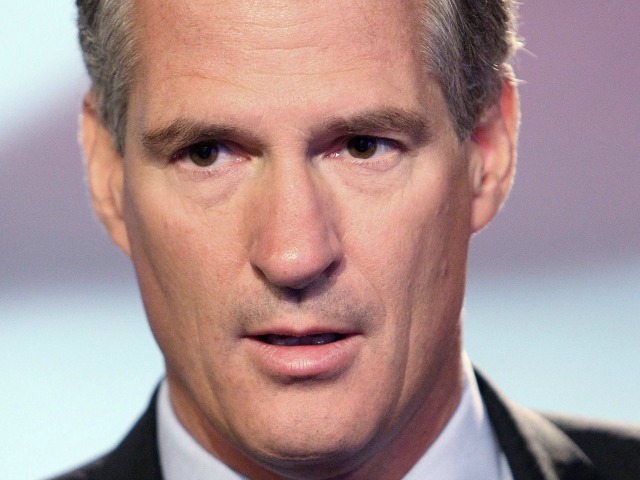WASHINGTON (AP) — Their majority in jeopardy, Senate Democrats unleashed a late-campaign round of attack ads Monday accusing Republicans in key races of harboring plans to cut Social Security and Medicare.
The commercials in Iowa, New Hampshire, Louisiana and elsewhere appear aimed at older voters, who cast ballots in relatively large numbers in midterm elections and have tended to support Republicans in recent years.
One ad, airing in Iowa, shows Republican candidate Joni Ernst on videotape saying, “Yes, I have talked about privatizing Social Security.”
Another, which began appearing in New Hampshire during the day, says that while Scott Brown was a senator from Massachusetts he voted to “cut Medicare and Social Security while giving tax breaks to millionaires and oil companies.”
Gretchen Hamel, a spokeswoman for Ernst, countered that the “Democratic attacks on Social Security are as predictable as they are false.” Jennifer Horn, Republican chairwoman in New Hampshire, said that Sen. Jeanne Shaheen, Brown’s opponent, “cast the deciding vote for Obamacare that cuts Medicare by $716 billion.”
The televised attack ads, financed by the Democratic Senatorial Campaign Committee, come with little over a week remaining until elections that will test whether Republicans can win control of the Senate for the final two years of President Barack Obama’s term. The GOP also is hoping to pad its majority in the House. Thirty-six states will elect governors.
Obama’s weak approval ratings have buoyed Republicans in numerous states, and Democrats are counting on a costly get-out-the-vote operation to save their Senate majority. GOP candidates must gain at least six seats to win a majority in the Senate that convenes in January.
Officials at the Democratic Senatorial Campaign Committee announced the new ads relating to Social Security and Medicare in Iowa, Louisiana and New Hampshire, in addition to one that began airing last week in Arkansas.
Separately, the Senate Majority PAC, an organization that backs Senate Democrats, is showing a commercial in Kentucky that says Republic leader Mitch McConnell “voted to privatize Social Security, gamble trust fund money in the stock market” where ’40 percent of it could have been lost” in the stock market decline that began in 2008.
Allison Moore, a spokesman for McConnell, said his campaign views the ad as inaccurate and is appealing to television stations to stop running it.
Republicans said the campaign attacks would fail.
Carl Forti, political director of American Crossroads, which has spent millions supporting Republican candidates, said, “Incumbent Democrats have been getting pounded for over a year for voting for Obamacare which cuts Medicare by hundreds of millions of dollars and Medicare Advantage as well.”
“Millions of votes have already been cast around the country. It’s a little too late for Democrats to try and muddy the waters by attacking Republicans for cutting Medicare,” he said.
There is little dispute about the importance of votes cast by older Americans, especially in midterm elections when there is no presidential election.
In the most recent midterm election, 2010, voters 65 and over accounted for 21 percent of all ballots. Two years ago, that percentage declined to 16 percent.
In both years, older voters supported Republicans over Democrats. They preferred Mitt Romney over Obama by 56-44 percent two years ago, according to interviews with voters leaving their polling places. In 2010 they gave 59 percent of their votes to Republican congressional candidates and only 38 to Democrats, according to a similar survey.
The struggle for support from older voters was particularly pointed in 2012. Romney’s vice presidential running mate, Wisconsin Rep. Paul Ryan, was the author of Republican budgets that contemplated significant changes in Medicare for people who were at least 10 years way from eligibility for benefits.
Some developments Monday:
___
EARLY VOTING:
About 8.6 million early votes have been cast in 27 states so far, and already the two parties are arguing about the trend.
In Iowa, where Ernst and Democratic Rep. Bill Braley are in a close Senate race, 306,369 early votes have been cast. Registered Democrats account for 41 percent of them, and Republicans for 40 percent. Four years ago, Democrats led 43 percent to 38 percent in early voting.
Republicans argue that since the gap is smaller than in previous elections, it portends success for Ernst in the race to replace retiring Democratic Sen. Tom Harkin.
Democrats counter that their ballots are coming in from Iowans who don’t routinely vote in midterm elections — so-called fall-off voters whom the party has targeted for months in an attempt to increase the number of voters.
SURROGATE CAMPAIGNING:
Surrogate appearances are ramping up as the election nears. Vice President Joe Biden campaigned in Davenport, Iowa, with Braley, while Ernst toured the state with Sen. Charles Grassley, who has been in office since 1980 and won his last campaign with 65 percent of the vote.
Former Senate Majority Leader Bob Dole returns to Kansas this week to try and help Republican Sen. Pat Roberts, who is in a difficult race with independent Greg Orman.
Sen. Elizabeth Warren of Massachusetts, mentioned as a potential Democratic presidential hopeful in 2016, is slated to campaign with Allison Lundergan Grimes in Kentucky later in this week. Louisiana Gov. Bobby Jindal, a possible GOP contender for the White House, will be in the state to appear alongside McConnell.
___
Associated Press writers Bill Barrow in Georgia, Adam Beam in Kentucky and John D. Hanna in Kansas contributed to this story

COMMENTS
Please let us know if you're having issues with commenting.